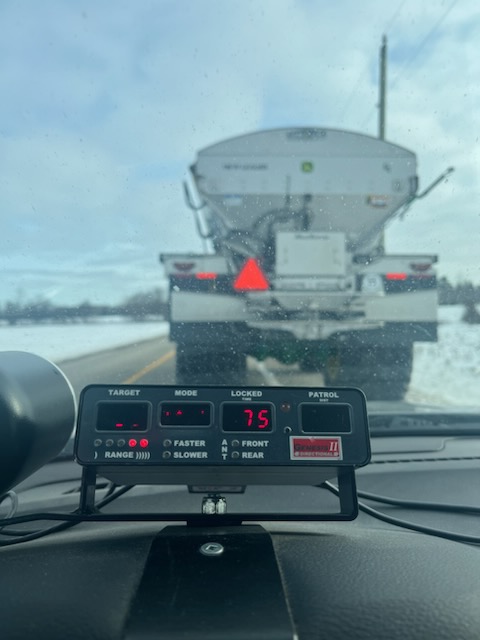by Nelson Zandbergen courtesy of Farmer’s Forum
Is it time to liberate modern farm machines from the 40 km/h maximum speed limit that applies to them when on the road in Ontario?
The question has been kicked into gear after a Wellington County OPP officer stopped and ticketed the operator of a fertilizer hauler for exceeding the slow-moving-vehicle limit — an action that triggered a social media backlash and 2,900 online comments.
The OPP detachment’s Feb. 28 Facebook post of the eyebrow-raising incident shows the back end of the pulled-over machine and its slow-moving vehicle sign, as viewed through the cruiser’s windshield. The officer’s on-dash radar reads 75 km/h.

Wellington County OPP “would like to remind you that tractors and implements of husbandry cannot go over 40 km/hr when traveling on a roadway,” the accompanying caption reads. “A tractor this size at those speeds presents a danger to the operator and to other motorists. Visit the Ontario Federation of Agriculture for more info.”
Such truck-like haulers — equipped with huge off-road tires — are a common sight in rural Ontario, moving between fields and agribusinesses to quickly disperse fertilizer in the spring. Also known as floater trucks, they are capable of travelling faster than 40 km/h but still qualify as an implement of husbandry, the same designation as a farm tractor under the Highway Traffic Act.
Wellington County OPP Const. Joshua Cunningham confirmed for Farmers Forum that the operator — not the company — received a ticket for exceeding the slow-moving-vehicle limit on a road south of Fergus. The $85 ticket “is not one that’s very often issued,” Cunningham said.
The Facebook post was shared over 540 times and generated 2,900 comments. Cunningham added that the detachment was “not trying to shame anybody” but was acting out of concern for safety and was simply enforcing the law.
But many replies to the post suggested the ticketing officer should have found other things to do.
Wrote Jon Hunt: “You know, I support the police in general because they have a difficult job to do, however, can’t you find something useful to do other than harass farm equipment? The rate of crime activity in our area has increased dramatically …. Perhaps your time is better spent investigating these crimes that have actual victims rather than harassing people for perceived dangers that are often overblown and ignore modern equipment safety factors. It seems to me that farmers traveling closer to road speeds is a good thing.”
Chris Pilger wrote: “I’m pretty sure you’re creating more of a hazard on the roadway pulling him over.”
Aaron Thomson wrote: “Seems like it would be much safer to let equipment go faster rather than impeding traffic. I’ve yet to hear of an accident due to speeding farm equipment but every day I see multiple near misses from impatient traffic passing equipment in unsafe places.”
“This fertilizer spreader has the same airbrake system as a highway tractor,” wrote Earl Reading, also observing the unit’s signal lights in the photo. He added that under the Highway Traffic Act, the machine can’t be inspected and licensed “due to its tires amongst other things. So fix the HTA to meet the ever-changing farm equipment and allow us farmers to feed this ungrateful society we live in.”
Reading’s comment, which garnered 770 likes, drew a reply from Audy Bedard: “Maybe the minister of agriculture should talk to the MTO and tell them that tractors move a little faster than they did in the 30s. And are completely safe at the higher speeds.”
But Joe Scott, worried about reforming the law, noted, “If they open that can of worms, they will open us up to safety-ing every cultivator and seed drill and hay wagon in the province. The ticket is far more affordable.”





